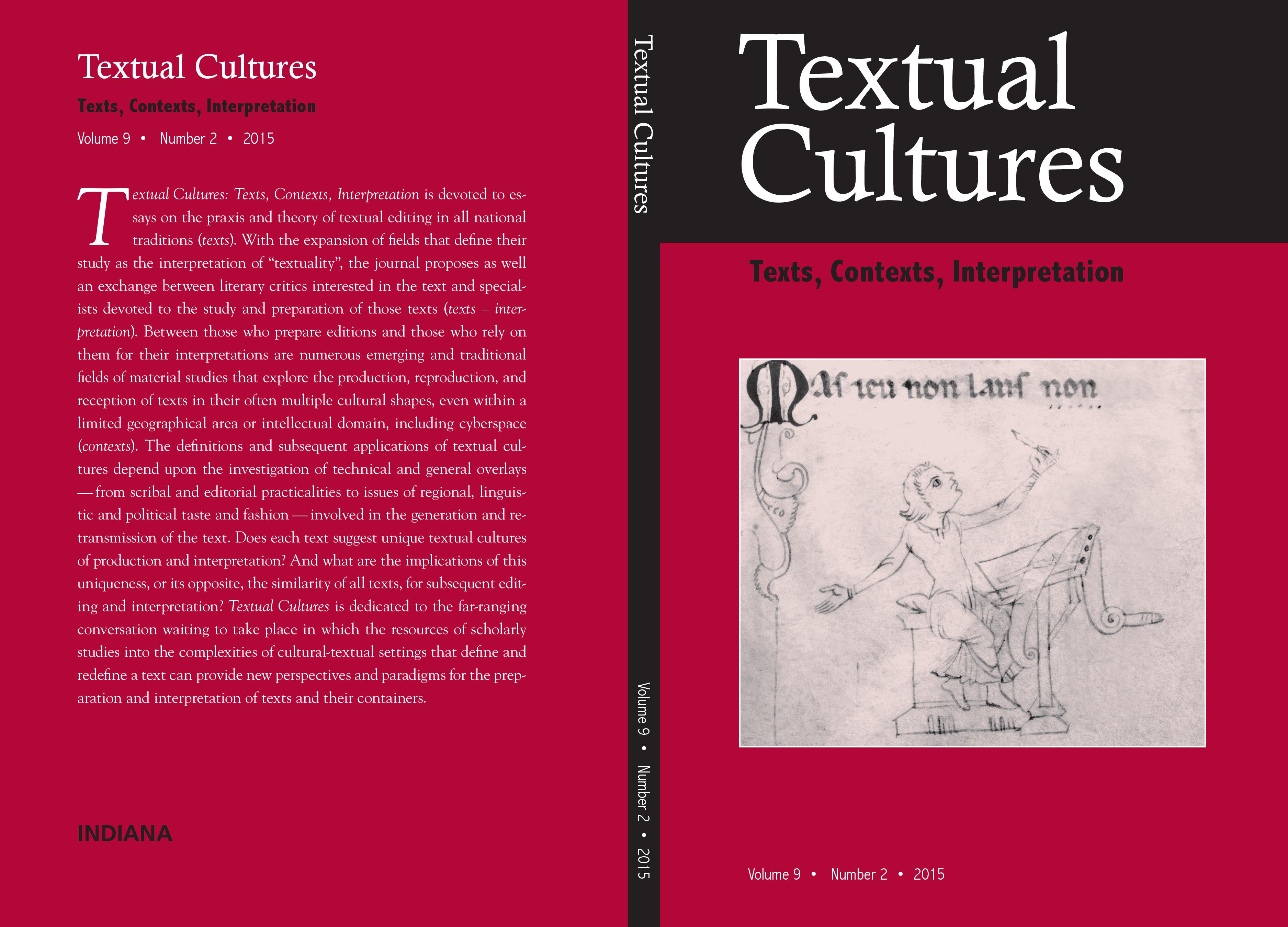The Composition of 'The Depressed Person'
Main Article Content
Abstract
Despite moving away from a predominant focus upon his most renowned novel Infinite Jest (1996) in recent years, David Foster Wallace studies has yet to broach more far-reaching questions regarding the textual status of Wallace’s work. This essay introduces the methodology of genetic criticism to Wallace studies, studying the composition of the short story ‘The Depressed Person’ in order to provide a template for much further genetic enquiry into Wallace’s canon. Genetic criticism involves the study of manuscripts and rough drafts with the aim of describing a process of writing. By treating text as process rather than as product, genetic criticism critiques the traditional notion of “the text itself.” Wallace’s writing shares a resistance to “finished products,” particularly after the publication of Infinite Jest, beginning with the volume of short stories Brief Interviews With Hideous Men (1999), in which the ‘The Depressed Person’ is collected; this is most emphatically the case for Wallace’s “unfinished” and posthumously published final novel The Pale King (2011), “the text” of which exists only in draft form. While reflecting on the relationship between the eponymous depressed person’s predicament and the story’s mode of composition, this essay moves on to consider the context for Wallace’s writing process in relation to influential modes of revision in modernism.
Downloads
Article Details
Authors who publish with this journal agree to the following terms:
- Authors retain copyright and grant the journal right of first publication with the work simultaneously licensed under a Creative Commons Attribution License (see:http://creativecommons.org/licenses/by/3.0/us/) that allows others to share the work with an acknowledgment of the work's authorship and initial publication in this journal.
- Authors warrant that their submission is their own original work, and that they have the right to grant the rights contained in this license. Authors also warrant that their submission does not, to the best of your knowledge, infringe upon anyone's copyright. If the submission contains material for which an author does not hold the copyright, authors warrant that they have obtained the unrestricted permission of the copyright owner to grant Indiana University the rights required by this license, and that such third-party owned material is clearly identified and acknowledged within the text or content of their submission.
- Authors are able to enter into separate, additional contractual arrangements for the non-exclusive distribution of the journal's published version of the work (e.g., post it to an institutional repository or publish it in a book), with an acknowledgment of its initial publication in this journal.
References
Adams, Tim. 2011. ‘Karen Green interview’, The Guardian (April 10), http://www.theguardian.com/books/2011/apr/10/karen-green-david-foster-wallace-interview.
Boswell, Marshall. 2003. Understanding David Foster Wallace. Columbia, SC: South Carolina University Press.
Boswell, Marshall, and Burn, Stephen. 2013. “Introduction”. A Companion to David Foster Wallace Studies. New York: Palgrave Macmillan.
Conn, Charis. 1997. Unpublished letter to David Foster Wallace (September 30). Wal-lace Archive, Harry Ransom Center, University of Texas (USA), MS-5155, 27.6–7
Ferrer, Daniel. 1998. ‘The Open Space of the Draft Page: James Joyce and Modern Manuscripts”. In The Iconic Page in Manuscripts, Print, and Digital Culture, edited by George Bornstein and Theresa Tinkle, 249–67. Ann Arbor, MI: Michigan University Press.
——— , J e d Deppman and Michael Groden, eds. 2004. Genetic Criticism: Texts and A v a n t -Te x t e s. Philadelphia, PA: Pennsylvania University Press, 2004.
Fordham, Finn. 2010. I do I undo I redo: the Textual Genesis of Modernist Selves. Oxford: Oxford UP.
Grésillon, Almuth. 1997. “Slow: Work in progress”. Word & Image: A Journal of Verbal/Visual Enquiry 13 (2): 106–123.
Holland, Mary K. 2013. ‘Mediated Immediacy in Brief Interviews With Hideous Men”. In Boswell 2013, 107–30.
Va n H u l l e, Dirk. 2009. “The Dynamics of Incompletion: Multilingual Manuscript Genetics and Digital Philology”. Neohelicon 36 (2): 451–61.
——— . 2 0 0 8 . Manuscript Genetics, Joyce’s Know-How, Beckett’s Nohow. Gainesville: Florida University Press.
——— . 2 0 1 3 . Modern Manuscripts.London: Bloomsbury.
——— . 2 0 0 3 . Te x t u a l A w a r e n e s s.Ann Arbor, MI: Michigan University Press.
Knox, Malcolm, ‘Everything and More’, The Monthly (November 2008), http://www.themonthly.com.au/issue/2008/november/1277253270/malcolm-knox/everything-more
Max, D. T. 2012. Every Love Story is a Ghost Story. New York: Granta.
Pa r k e r, Hershel. 1987. ‘‘The Text Itself’–Whatever That Is”. Te x t 16: 47– 62.
Shillingsburg, Peter. 1996. Scholarly Editing in the Computer Age: Theory and Prac-tice Ann Arbor, MI: Michigan University Press.
Sullivan, Hannah. 2013. The Work of Revision. Cambridge, MA: Harvard University Press.
Wa l l a c e, David Foster. Unpublished manuscript (MS1). “A Depressed Person”. Harry Ransom Center, University of Texas (USA), MS-5155, 27.6–7.
———. Unpublished typescript (TS1). “Provenience, Or: A Depressed Person”. Harry Ransom Center, University of Texas (USA), MS-5155, 27.6–7.
———. Unpublished typescript (TS2). “Provenience, Or: A Depressed Person”. Harry Ransom Center, University of Texas (USA), MS-5155, 27.6–7.
———. 1999. “Brief Interview With a Five Draft Man”. Amherst Magazine (Spring issue), https://www.amherst.edu/aboutamherst/magazine/extra/node/66410.Williams, Mark, and Danny Penman. 2011. “The New Psychology of Depression”. http://podcasts.ox.ac.uk/series/new-psychology-depression.
